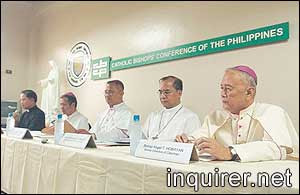
The Catholic Bishop’s Conference of the Philippines (CBCP) has selected new set of officers and I believe this has a lot to do with its present stand on various social issues and the Philippine Charity Sweepstakes (PCSO) scandal that 7 of their peers are facing. In our lenses as citizens, they dipped their fingers in the un-holy waters of patronage politics if not partisan politics.
The CBCP will have a new president in the person of Cebu Archbishop Jose Palma starting December. The 61-year-old and incumbent CBCP Vice President, Palma will succeed Tandag, Surigao del Sur Bishop Nereo Odchimar whose term as CBCP president ends on Nov. 30. The CBCP elected a new set of officers during its 103rd plenary session that started last Saturday, July 9, 2011. The president and the vice-president are elected for two-year terms and can serve for a minimum of two terms. Usually, they are reelected for their second and last term but for some reason, Odchimar declined a second term being the president of the conference. The Misubishops were undoubtedly noticed for figuratively beating the speed limit.
In December 12, 1967, the Holy See approved CBCP’s Constitution and prior to this the group was called Catholic Welfare Organization (CWO). CBCP meets twice a year, in January and July. Its leadership is composed of a president, vice-president, a secretary general and a governing body called Administrative Council which speaks for CBCP in between meetings. There are also various Episcopal Commissions which carry out activities of the Conference.
CBCP members and even their previous presidents represent several differences on looking at things. For example in 2005, Jaro Archbishop Angel Lagdameo became president and openly expressed judgments on the supposed faults of then president Gloria Macapagal-Arroyo. Lagdameo openly declared the GMA was corrupt and became one of her staunch critics in her last 4 years in Malacanan. On the other hand, his predecessor, Davao Archbishop Fernando Capalla issued a document asking GMA to stay in the wake of the Garci scandal. Capalla was perceived by many political onlookers as GMA’s ally while Lagdameo as anti-GMA. Political animals as they are, the bishops as individuals have different preferences when it comes to political personalities.
This is how they work on certain socio-political issues. Be reminded, and many of us are not aware of this for we often generalize CBCP members on specific concerns, especially those who are in the secular media. Let us remember that the matters agreed upon during CBCP meetings have NO binding force unless they are passed by the 2/3 of the body; then they have the force of law. However, by Church law (the Canon Law), a bishop has supreme authority in its own diocese. No other authority, except that from Rome, may interfere with the affairs of the diocese. It is in a manner of saying that CBCP’s collective decisions are enforced more through “gentleman’s agreement” than anything else. Even then, a bishop may interpret a policy statement far differently or not in consonance that another colleague. While there is a mental acceptance of the principle of collegiality among the bishops, there is still a wide gap between that and actual practice. For example, on CBCP’s open declaration of “war” against RH Bill, Mining, Divorce, etc., in many dioceses and religious organizations, concrete and visible mass actions are yet to be launched.
That is why it is very valid to ask how effective and significant these responses (read: pastoral letters, statements, etc) were and they should be argued every now and then. But one thing is certain, the bishops integrate evangelization with an engagement in temporal problems but there are still a lot of things to be done specially in their common and shared response. As a have presented to you a while ago the differences between the two separate statements of Capalla and Lagdameo on GMA, one of the basic flaws of majority of CBCP documents- because of the mentioned differences among the bishops- they reflect pluralism within the Catholic Church in the Philippines. The division and the differences of liberal, radical, conservative and moderate bishops have resulted in compromise statements but of course there are exemptions specially those with regards to morals and dogma.
The CBCP as a flock of shepherds who leads our pastoral actions and faith is yet to overcome many things. Both as individual persons and as office-holders and we the laity have to be responsible not only in fostering our support, trust and hope in them but to challenge and criticize their actions if deemed inappropriate. These are also important dimensions of being a community, a dynamic and a pilgrim Church.
In short, Church leaders, priests and especially bishops, who are without doubt seemed to be involved in partisan political struggle and those who aligned themselves with the wealthy and the influential and fail concretely to show concern should be reminded by every faithful like us and even their peers.
And we too show our love for our Church this way. Jesus examples made me think of this when He confronted the Pharisees during His time…
-----
(Photo: Philippine Daily Inquirer)






No comments:
Post a Comment